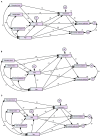Predictors of Nutritional Status, Depression, Internet Addiction, Facebook Addiction, and Tobacco Smoking Among Women With Eating Disorders in Spain
- PMID: 34899416
- PMCID: PMC8663168
- DOI: 10.3389/fpsyt.2021.735109
Predictors of Nutritional Status, Depression, Internet Addiction, Facebook Addiction, and Tobacco Smoking Among Women With Eating Disorders in Spain
Abstract
Eating disorders (EDs) are a complex group of psychiatric conditions that involve dysfunctional eating patterns, nutritional alterations, and other comorbid psychopathologies. Some women with EDs may develop problematic internet use while they attempt to get information on dieting/weight control or get online support from people with similar problems. They may also drift toward tobacco smoking as a method to regulate their weight or to cope with their weight-related dysphoria. The occurrence of these conditions in EDs may prolong disease course and impede recovery. This study used structural equation modeling to investigate nutritional status (noted by body mass index, BMI), depression psychopathology, internet addiction (depicted by the Internet Addiction Test), Facebook addiction (depicted by the Bergen Facebook Addiction Scale), and smoking among 123 Spanish women diagnosed with EDs (mean age = 27.3 ± 10.6 years). History of hospitalization, marital status, age, and the level of education predicted BMI in certain ED groups. BMI did not predict depression, but it predicted internet addiction, Facebook addiction, and smoking in certain ED groups. Depression did not predict BMI, internet/Facebook addition, or smoking in any ED group. Some sociodemographic and clinical variables had indirect effects on depression, internet addiction, and Facebook addiction while age was the only variable expressing a direct effect on all outcome measures. Age, education, and history of prolonged treatment predicted smoking in certain ED patients. The findings signify that a considerable target for interventional strategies addressing nutritional and addictive problems in EDs would be women with high BMI, history of hospitalization, history of prolonged treatment, who are particularly young, single, and less educated. Replication studies in larger samples, which comprise various subtypes of EDs from both genders, are warranted to define the exact interaction among the addressed variables.
Keywords: Facebook addiction/internet addiction; Spain/Spanish; body mass index/BMI; depression psychopathology; eating disorders; nutritional status; tobacco smoking; women.
Copyright © 2021 Ali, Hori, Kim and Kunugi.
Conflict of interest statement
The authors declare that the research was conducted in the absence of any commercial or financial relationships that could be construed as a potential conflict of interest.
Figures


Similar articles
-
The Bergen Facebook Addiction Scale: its psychometric properties and invariance among women with eating disorders.BMC Womens Health. 2022 Mar 31;22(1):99. doi: 10.1186/s12905-022-01677-2. BMC Womens Health. 2022. PMID: 35361186 Free PMC article.
-
Internet addiction and Facebook addiction in Spanish women with eating disorders.Arch Psychiatr Nurs. 2020 Dec;34(6):442-448. doi: 10.1016/j.apnu.2020.07.023. Epub 2020 Jul 22. Arch Psychiatr Nurs. 2020. PMID: 33280664
-
Exploring the Relationship Between Excessive Social Media Use and Eating Disorders Among Young Adults: Evidence From a Bangladesh-Based Cross-Sectional Study.Brain Behav. 2025 May;15(5):e70540. doi: 10.1002/brb3.70540. Brain Behav. 2025. PMID: 40350702 Free PMC article.
-
Associations between bone mineral density, body composition and amenorrhoea in females with eating disorders: a systematic review and meta-analysis.J Eat Disord. 2022 Nov 18;10(1):173. doi: 10.1186/s40337-022-00694-8. J Eat Disord. 2022. PMID: 36401318 Free PMC article. Review.
-
Psychiatric and medical comorbidities of eating disorders: findings from a rapid review of the literature.J Eat Disord. 2022 Sep 5;10(1):132. doi: 10.1186/s40337-022-00654-2. J Eat Disord. 2022. PMID: 36064606 Free PMC article. Review.
Cited by
-
COVID-19-Related Psychological Trauma and Psychological Distress Among Community-Dwelling Psychiatric Patients: People Struck by Depression and Sleep Disorders Endure the Greatest Burden.Front Public Health. 2022 Jan 7;9:799812. doi: 10.3389/fpubh.2021.799812. eCollection 2021. Front Public Health. 2022. PMID: 35071173 Free PMC article.
-
Psychometric evaluation of the Arabic version of the Eight-item Center for Epidemiological Studies Depression Scale (CESD-8): Specific cultural considerations for the assessment of depression.Int J Nurs Stud Adv. 2025 Feb 10;8:100310. doi: 10.1016/j.ijnsa.2025.100310. eCollection 2025 Jun. Int J Nurs Stud Adv. 2025. PMID: 40535791 Free PMC article.
-
The Impact of Event Scale-Revised: Examining Its Cutoff Scores among Arab Psychiatric Patients and Healthy Adults within the Context of COVID-19 as a Collective Traumatic Event.Healthcare (Basel). 2023 Mar 20;11(6):892. doi: 10.3390/healthcare11060892. Healthcare (Basel). 2023. PMID: 36981549 Free PMC article.
-
Mental health and health behaviours among patients with eating disorders: a case-control study in France.J Eat Disord. 2022 Nov 10;10(1):160. doi: 10.1186/s40337-022-00691-x. J Eat Disord. 2022. PMID: 36357945 Free PMC article.
-
Impact of Physical Activity and Bio-Psycho-Social Factors on Social Network Addiction and Gender Differences in Spanish Undergraduate Education Students.Behav Sci (Basel). 2024 Feb 2;14(2):110. doi: 10.3390/bs14020110. Behav Sci (Basel). 2024. PMID: 38392463 Free PMC article.
References
-
- Jáuregui-Lobera I, García-Cruz P, Carbonero-Carreño R, Magallares A, Ruiz-Prieto I. Psychometric properties of Spanish version of the Three-Factor Eating Questionnaire-R18 (Tfeq-Sp) and its relationship with some eating- and body image-related variables. Nutrients. (2014) 6:5619–35. 10.3390/nu6125619 - DOI - PMC - PubMed
LinkOut - more resources
Full Text Sources

